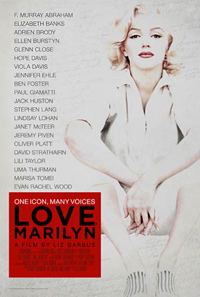Intimate Side of an Iconic Life: Garbus Digs Through Monroe’s Personal Writings
 Liz Garbus is well aware that the life and times of Marilyn Monroe have been thoroughly researched and exhaustively commented on from nearly every prospective imaginable – except from that of Norma Jeane herself. The director was approached about making the film after several boxes of Marilyn’s private journals and letters were discovered in the holdings of a close friend. These personal writings bare insight into a woman on one hand bold, tenacious and focused, and in the other, emotionally distraught and professionally unsure of herself. All of these thoughts and contemplations are presented here in a creative twist by Garbus. Instead of flatly reading through the material, a variety of high profile actresses and actors reinterpreted the written thoughts as they saw fit, making Love, Marilyn a captivating and highly personal retelling of a story we thought we already knew.
Liz Garbus is well aware that the life and times of Marilyn Monroe have been thoroughly researched and exhaustively commented on from nearly every prospective imaginable – except from that of Norma Jeane herself. The director was approached about making the film after several boxes of Marilyn’s private journals and letters were discovered in the holdings of a close friend. These personal writings bare insight into a woman on one hand bold, tenacious and focused, and in the other, emotionally distraught and professionally unsure of herself. All of these thoughts and contemplations are presented here in a creative twist by Garbus. Instead of flatly reading through the material, a variety of high profile actresses and actors reinterpreted the written thoughts as they saw fit, making Love, Marilyn a captivating and highly personal retelling of a story we thought we already knew.
After a brief history of her youth, the story begins where Marilyn’s career took off, with early modeling gigs and the subsequent screen test that led to fame and fortune with 20th Century Fox. Despite her eventual immense popularity, Monroe’s ability as an on screen talent was under constant scrutiny, but even before others were to comment, her own lack of self confidence was an ever present topic in her writing. No matter how publicly beloved she became, she never felt adequate either professionally or personally in either of her highly publicized marriages to Joe DiMaggio or Arthur Miller, and these doubts run throughout many personal poems and journal entries over the years.
Reinterpreting Marilyn’s intimate contemplations is a truly star studded cast that includes Ben Foster, Paul Giamatti, Marisa Tomei, Evan Rachel Wood, Elizabeth Banks, Uma Thurman, Jeremy Piven, Viola Davis, Adrien Brody, Lindsay Lohan, Ellen Burstyn, Glenn Close and more. While Marisa and Uma are obvious stand outs, really channeling the essence of Monroe’s persona in their chosen monologues, Giamatti, Foster, and Brody not only recreate choice pieces of Marilyn, but words written about her by a variety who knew her personally, one of which was the elegantly articulate Truman Capote, who’s words ring strikingly potent here.
Offsetting the abundance of green-screened discourse, Garbus also spoke with a few of those that knew Monroe as a woman outside the spotlight, and along the way managed to unearth personal photos and behind the scenes footage not publicly released before, all of which works to flesh out and give perspective to many of the included written passages. While hardcore Marilyn fans and those very familiar with her story will find something new here, the film will work best for casual fans who don’t know all the dirty details and proposed conspiracy theories. With it’s fresh perspective on the immortalized star and an unconventional take on the docu format, Love, Marilyn takes a stab at humanizing an icon and manages to leave a fascinating, though worn, impression.
Reviewed on September 15th at the 2012 Toronto International Film Festival – Gala Presentations Programme –
105 Mins.


